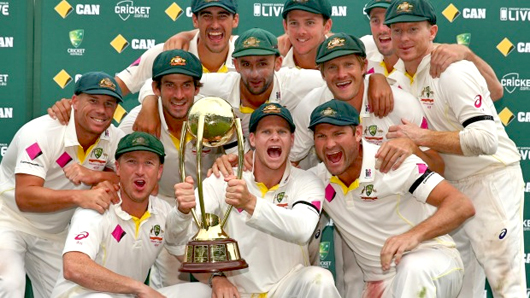
Jan 11: They huffed, they puffed, they tried all they knew. They created enough genuine chances – and some half-chances, some quarter-, some one-eighth-, some mirages for crazed optimists – but the Australian bowling attack was eventually held at bay by a worthy opponent. Mitchell Starc and Josh Hazlewood bowled well enough to fill local hearts with hope for years to come, but fulfilment will have to wait for another day. Through skill, application and the character they have shown throughout, India's batsmen saved a draw that reflected the balance between the teams. Australia won the series, India won respect.
Before taking the field and during their breaks, the Australians were doubtless talking about "creating chances". It's the kind of process-based talk that dominates sport. Rather than focus on winning, football teams talk about their structures, golfers talk about birdie chances (instead of actual birdies), swimmers talk about maintaining form. To concentrate on the end result is seen, with some justification, as placing too much of the wrong kind of pressure on the participant.
What it also does is introduce a kind of fatalism into the game, as if the creation of a certain number of chances will inevitably lead to conversion. But there is no such law. Adam Scott creates as many chances as Jack Nicklaus ever did, perhaps more. But Nicklaus did not concentrate his efforts on getting the ball on the green and letting probabilities take over; he focused on the numbers he needed to beat the other guy.
On day five, the Australian cricketers did create their chances; but they had done this in the first innings here, and in Melbourne too, while lacking the polish to convert them. Staunch batting from India also played a part. When creating chances does not lead to wickets, confidence begins to waver. The belief in that mystical equation – X chances equal Y wickets – is shaken.
By my count, Australia created seven chances of varying feasibility before the tea break on Saturday, of which they converted two. It took 10 overs for the first, when Murali Vijay outside-edged Nathan Lyon over a leaping Shane Watson, via Brad Haddin's thigh. Three overs later, K.L. Rahul advanced to smother Lyon and gloved a catch down the leg-side.
For the best part of two hours, as Vijay and Rohit Sharma dug in, only one more near-chance materialised, Sharma's glove bobbing a ball from Lyon wide of a wrong-footed Joe Burns at bat-pad. While no wickets came, this period produced some of the best cricket of the series. Hazlewood gave up a solitary single in his first five-over spell. Ryan Harris and Starc were similarly accurate, and Lyon teased. The Australian close fieldsmen kept up a steady flow of conversation with the batsmen, leading to the intervention of umpires whose faces could not have looked more helpless if they were the ones being gossiped about.
After 35 overs of Waiting for Watto, the all-rounder came on from the Randwick end and, as so often, brought about the subtle but telling change in the mood of the game. Shane Watson immediately induced false strokes from Sharma, and in the next over, Harris broke Vijay's concentration, a loose drive flying to Shaun Marsh at short cover. Marsh put down the chance, tough but graspable. Was it going to be that sort of day again, when faith in the creative process would only go part of the way to the desired output?
Next over, the Australian captain took the matter into his own hand. Watson got a ball to jump at Sharma, whose intention to guide the ball stylishly to the third man boundary became a horror-stricken edge into a gap closed by the acrobatic Steve Smith. Spidercam hovered at a safe distance as Smith provided the inspiring moment, the difference between chance and dismissal.
Virat Kohli and Vijay then batted from the 39th over to the 61st. They fought to reintroduce another idea of inevitability: the supremacy of bat over ball. No chances came from them, save for one edge from Kohli off Watson that not even Smith's telescoping right arm could reach, and an lbw appeal against Vijay to which Richard Kettleborough gave a rare poor decision.
But when the chances did come after tea, they cascaded. Seven in two sessions became nine in an hour. More importantly for Australia, the conversion rate followed the US dollar. After accelerating from 50 to 80, Vijay, perhaps entertaining his first thought of going for the win, edged Hazlewood. In the next ten minutes, the previously flawless Kohli popped a near-caught and bowled to Lyon, skewed a drive past gully, and finally edged Starc to be sharply caught by Watson at first slip. The hegemony of the bat left the field with the Indian master, and now, not only did chances come, they came with thud after thud like a monster down a staircase: Starc into Suresh Raina's pads, Lyon into Wriddhiman Saha's, Hazlewood into Ravi Ashwin's. Getting behind the line, for the Indian batsmen, now seemed not safe technique but the riskiest.
In the end, fine Indian batting had the last word, a fitting coda to a series flooded with run-scoring. This has been a summer for talented batsmen to fill their resumes with real, meaty scores. Bowlers have had to survive on the thinner stuff of chance and hope.






Comments
Add new comment